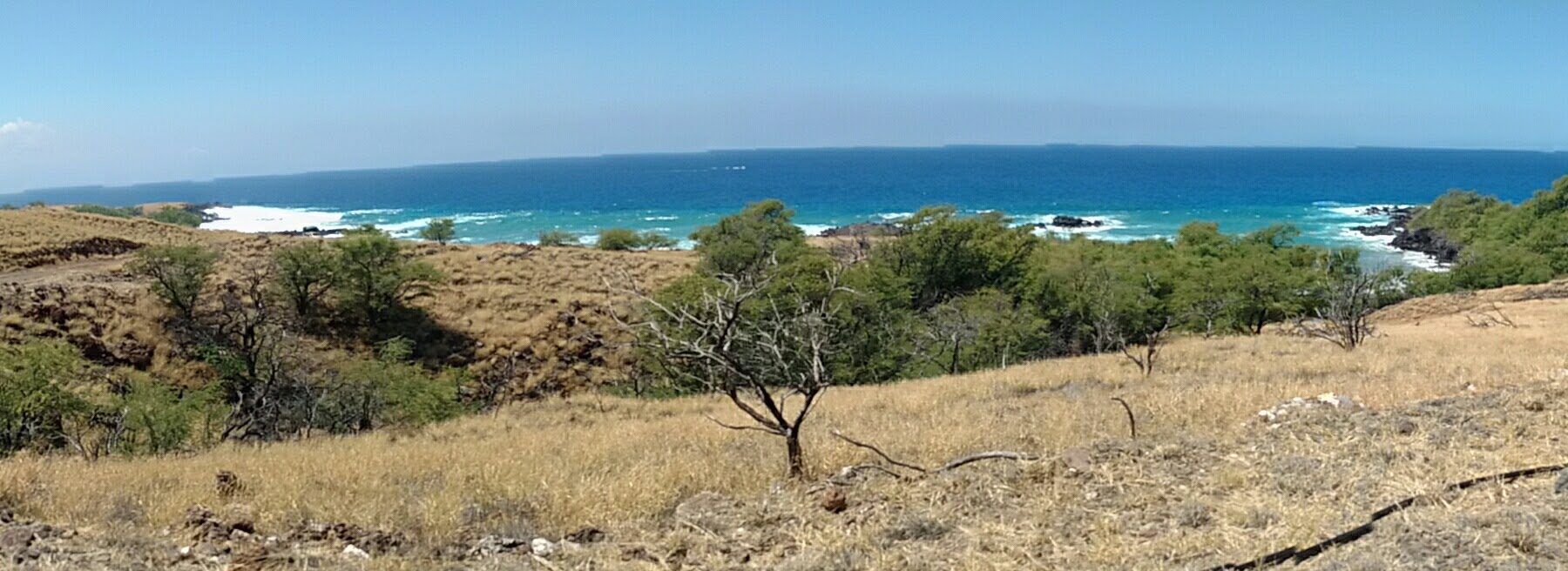Overview
Ka Ike O Ka Aina (KOA) is a non-profit organization dedicated to the Hawaiian culture and education of our youth. The vision and kuleana (responsibility) of KOA is to mālama ‘āina (care for the land) and malama lāhui (care for its people) through our valued academic partnerships and community outreach efforts. KOA is located on a 40 acre coastal property – what is known to being a culturally iconic makahiki (festival) site for King Kamehameha I.
After nearly two centuries or intensive cattle grazing, this once productive landscape has degraded to a point of extreme degradation. Since the turn of the century, the property, which is the coastal section of an intact ahupua’a (or ancient land division that spanned from ridge to reef) has been decommissioned of ungulates and now zoned as a conservation easement under a special-use management plan.
Since, KOA has installed a fresh-water well, storage tanks and irrigation throughout. We intend to reforest the parcel with native species that are ecologically and culturally important to the native Hawaiian culture. Our intent is to create a sediment trap for up-stream wind and rain erosion. Koa also plans to install alluvial berms to divert and disperse seasonal flood water in an effort to mitigate run-off to the ocean.
For every aspect of implementation and monitoring, KOA is collaborating with academic, government and NGO agencies. Our mission is to bridge cultural and academia knowledge systems to better prepare the next generation of emerging local students and scientists from a pedagogical perspective.
Quick Facts
Project Location:
Leeward Kohala Field System, 20.0859161, -155.71713320000003
Geographic Region:
Pacific Ocean
Country or Territory:
Hawaii
Biome:
Coastal/Marine
Ecosystem:
Coral Reef, Seagrass & Shellfish Beds
Area being restored:
Near-shore terrestrial/marine
Project Lead:
Kaipo Dye
Organization Type:
NGO / Nonprofit Organization
Project Partners:
University of Hawaii
UH SeaGrant
Na Kilo Aina
Hawaii Community College
Location
Project Stage:
Implementation
Start Date:
2017-11
End Date:
2020-11
Planning \ Design:
6
Implementation:
24
Post-Implementation Maintenance:
6
Monitoring & Evaluation:
36
Primary Causes of Degradation
Agriculture & Livestock, Climate Change, Dams & Hydrology, Deforestation, Fire & Weather Events, Fragmentation, Invasive Species (native or non-native pests, pathogens or plants)Degradation Description
For more than 2 centuries, the iconic cultural site has degraded as a result of intensive grazing and a changing climatic system. The project mission is to restore the water shed through re-vegetative and landscape design that serves as a sedimentation trap. Our vision is to improve the health and function of the inter-tidal marine ecosystem.
Defining the Reference Ecosystem
The reference ecosystem is based on diverse sources of information (e.g. multiple extant reference sites, field indicators, historical records, predictive data).Reference Ecosystem Description
Our site is the most seaward landscape of the iconic Leeward Kohala Field System. Stories of the past civilization suggests that this topography served a large, growing and specialized population. The interesting cultural aspect of the area displays a lifestyle that balances human existence and ecological stability – hence the parable “He Ali’i ka ‘aina; he kaua ke kanaka” – the land is chief; the people its servant.
Project Goals
Pedagogical experiential learning that is germane to the people of the area is most important to our mission. Though the goal of this project is to stabilize the near-shore marine environment through land stewardship, our mission is to engage students at all levels – Kohala middle-schoolers: inventory and motoring the inter-tidal splash-zone; Hawaii Community College: native plant propagation, planting and monitoring; University of Hawaii: conservation planning, run-off monitoring and data analyses, community resources management.
Monitoring
Monitoring Details:
Point source soil run-off (wind and rain) identification and quantification;
Native plant survival and development;
Invasive species and fire suppression and native/invasive plant competition; and
Reef coral and algae coverage and reproduction/development.
Start date, including baseline data collection:
2018/04
End Date:
perpetual
Stakeholders
Ka Ike O Ka Aina (PI) – a non-profit organization committed to land stewardship and cultural and educational outreach.
UH SeaGrant Program – Na Kilo Aina, youth-based conservation monitoring program
Malama Kai Foundation – Kohala Middle School Ocean Warriors program
University of Hawaii at Manoa: EL4RC (Experiential Learning for Resilient: Culture, Conservation, Community and Climate
Hawaii Community College: Forest T.E.A.M. (Tropical Forest Ecosystem and Agroferstry Management)
Description of Project Activities:
Restoration of native species post ungulate removal;
Installation of a water well, fresh-water storage tanks, irrigation, fire breaks and alluvial water ways to disperse storm run-off;
Planting of forage species (i.e. NFP's), then tree, shrub and native grass species;
How this project eliminated existing threats to the ecosystem:
Marine: Water quality - siltation and soil run-off is out-competing coral and algae development.
Terrestrial: Desertification and water quantity - wind and rain erosion has reduced water holding capacity and increased invasive species proliferation and noxious fire-fuel grass loading.
How this project reinstated appropriate physical conditions (e.g. hydrology, substrate)",:
Objective one: reduce silt load into the ocean
Objective two: Increase soil nutrient and water holding capacity
Objective three: Increase marine biomass production
Objective four: Increase community awareness of culture and environment through outreach and educational partnerships.
Ecological Outcomes Achieved
Socio-Economic & Community Outcomes Achieved
Primary Contact
Name:
Kaipo Dye
Affiliation:
University of Hawaii at Manoa/ Ka ike O Ka Aina
City:
Kurtistown
State:
HI


